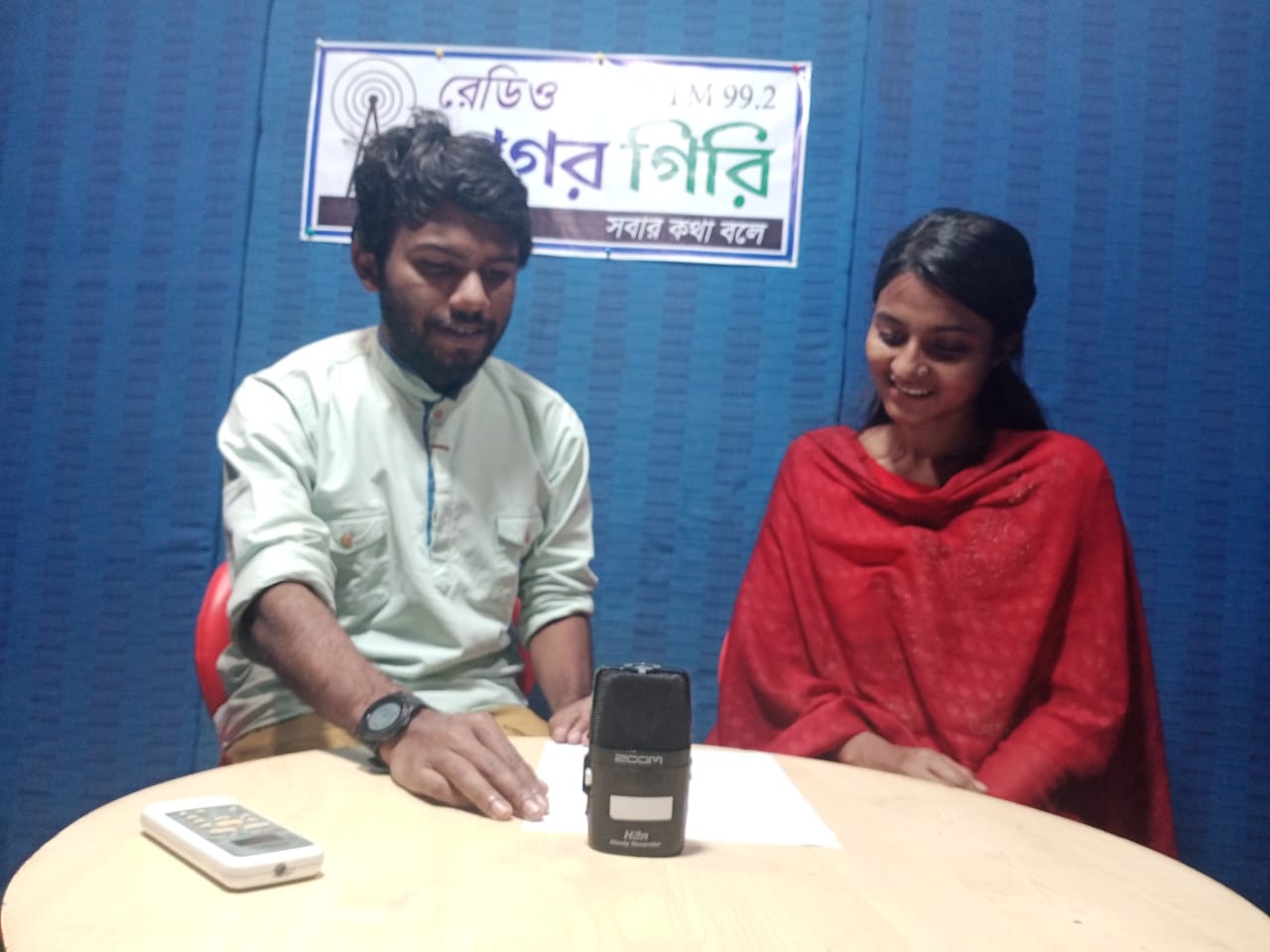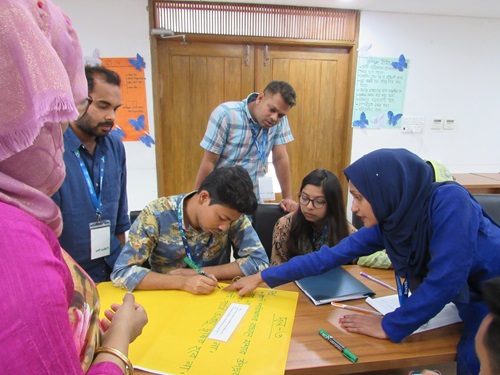22. Description:
(Please provide a short description of the project in 150 to 200 words describing the project’s objectives, results achieved, and impact generated.)
Female participation in Bangladesh’s labor force has increased to 42.68% in 2022, up from 36.3% five years ago, according to a survey report conducted by the BBS released on 29 March 2023.
Despite contributing to household income, they have little or no role in making decisions about household financial matters. Their access to and control over the money they earn are very low because of their poor status in their families, and lack of experience, which results in low confidence levels. Usually, they hand over all their earnings to their husbands, or fathers, and have no say in decisions about how that money is spent. Further, the men in many of these families do not seem to know or will to plan and save.
Addressing the challenges, BNNRC has been implementing initiatives to enhance women’s status in the family and workplace to build their image and capacity as holders of knowledge through digital financial literacy and to build a solid digital cashless payment in line with mobile banking and digital financial services for propelling into the digital age.
Under these initiatives, BNNRC has been supporting community radios to develop radio content and organize a series of live discussions on varied issues including financial literacy, mobile financial services, online agent banking, and digital payment, Communication skills, problem-solving & and decision-making, and Time and Stress Management and provided training for radio broadcasters and volunteers.
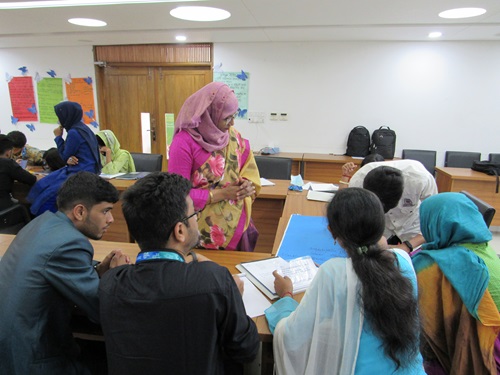
28. Target beneficiary group(s):
Other target beneficiary group(s):
Around 1 million listeners from 10 Community Radio stations coverage area in Bangladesh.
29. Replicability
Please describe how and where this project is replicable.
The activities are to be implemented to aware and build the capacity of the community people, particularly youth women who are entering the job sector and also already employed aware of self-management, financial planning, mobile financial services, online agent banking, and digital payment, Communication skills, the benefits of savings, budgeting and the risks in their absence through series of radio programs, which is replicable in any community.
As community radio has always inspired the marginalized voice to share opinions to address political and social action. Besides, it would be used as a tool for both active and passive communication and outreach in worldwide. Besides, the Social Media Campaign through the radio’s Facebook page will act as a virtual platform for young people who have ideas to share on how to poverty reduction, and gender equality and provide financial education through building strong institutions and partnerships.
30. Sustainability
Please describe how this project is sustainable.
Through the initiatives, around 115 radio broadcasters and volunteers where 80 are women trained in financial literacy, mobile financial services, online agent banking, digital payment, Communication skills, problem-solving & and decision-making, and Time and Stress Management and they also practice in their lives so that their professionalism can grow and continue.
Besides the radio programs provided youth and youth women with tools and digital skills that generate evidence to support their demands and help them to identify and prioritize areas of investment.
The program operates inclusively, including relevant media stakeholders, communication experts, Civil Society Organizations, and government officers which ensures long-term empowerment building. The program also generated community-led priorities to inform policymakers and duty-bearers to make effective decisions regarding inclusive development.
Besides, linking the social media platform will ensure that the program will have a deep, sustainable and multiplying impact, where the indirect beneficiaries will exceed several thousand.
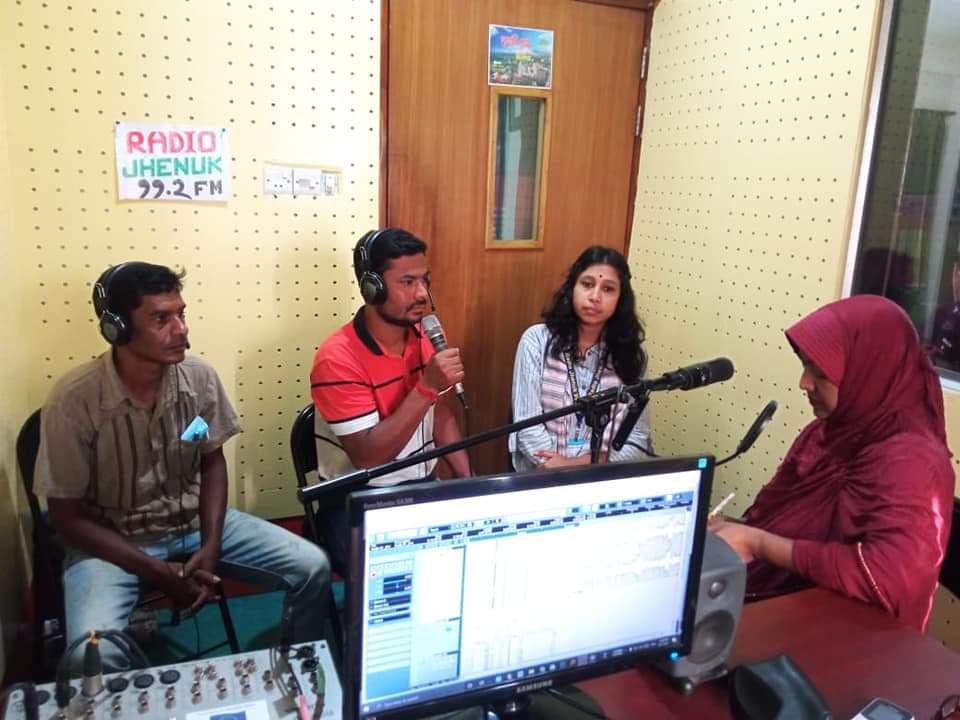
31. WSIS values promotion
Through this intervention, WSIS values (Action line- C4) in Bangladeshi communities are strongly adhered to and promoted extensively. This is done through building the capacity of women and encouraging them as well as other community people to financial literacy, mobile financial services, online agent banking, and digital payment, as well as self–learning and decision-making in families and workplaces.
How does this project promote WSIS values in your community?
32. WSIS Action Lines:
Action Line C4 (Capacity Building).
33. Sustainable Development Goals (SDGs)
This project is linked to the SGDs in the following ways:
SDG-3. Ensure healthy lives and promote well-being for all at all ages: Financial literacy is the capacity to identify financial needs that help to achieve the goals of one’s life for a secure economic life. Not only does it give us the capacity to use financial services available in the financial market safely and securely, it also encompasses the knowledge, awareness, and skills to make decisions about budget, savings, investments, borrowing, and expenditures in an informed manner. Financial literacy facilitates better financial planning, to further achieve the goals of one’s life.
SDG-5. Achieve gender equality and empower all women and girls: Promote regional development and improve the ability of sustainable development through the exchange of information and knowledge.
SDG-10. Reduce inequality within and among countries: Educating the rural youth and youth women including garment workers and their families in financial management issues will empower our young generation and diminish the existing financial gap that is created among countries.
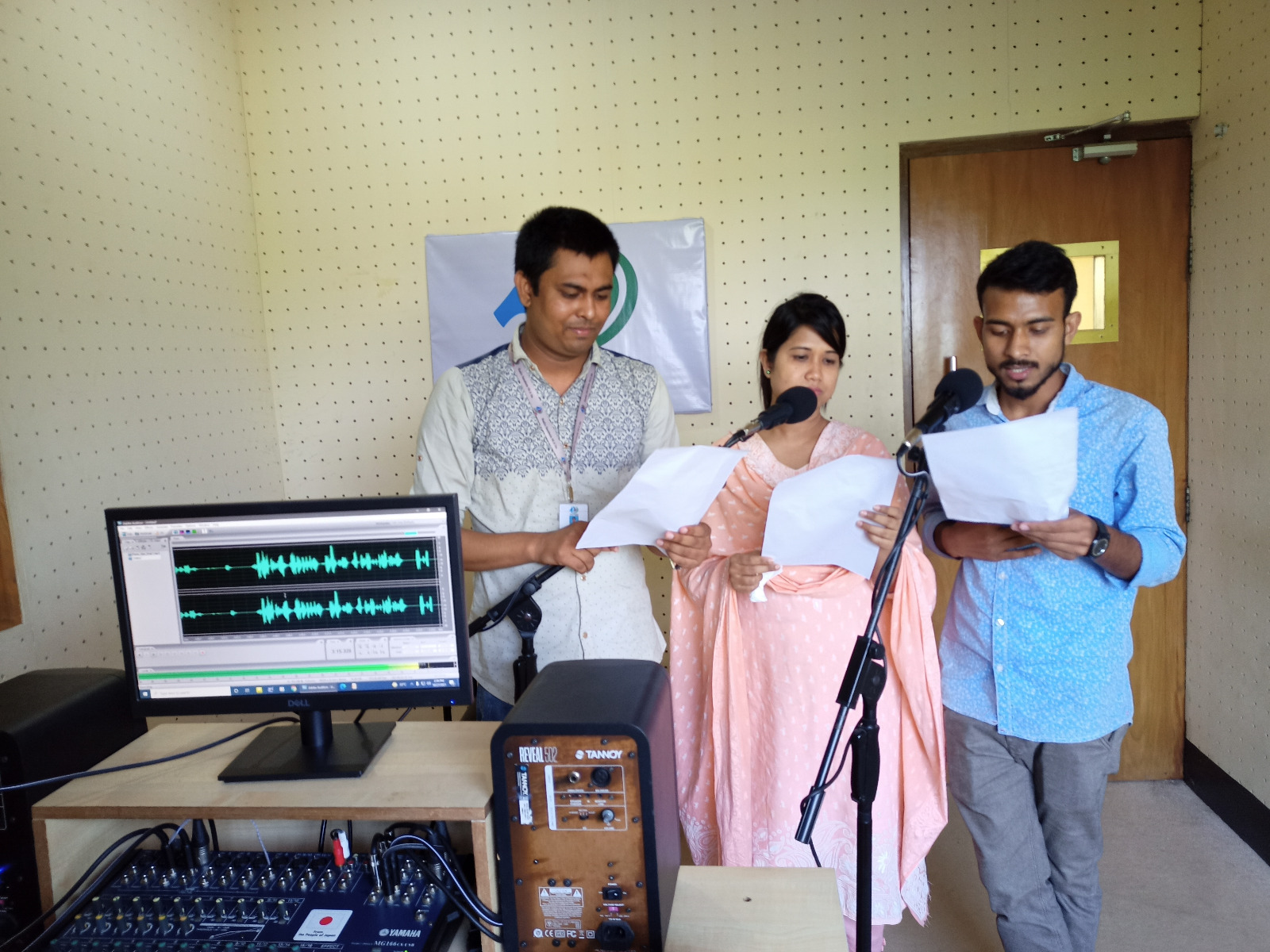 58. Contribution to the implementations of WSIS Action Lines and the Sustainable Development Goals
58. Contribution to the implementations of WSIS Action Lines and the Sustainable Development Goals
Please describe how the project contributes to the implementation of the selected WSIS Action Lines and Sustainable Development Goals.
The initiatives have addressed Action Line C4 (Capacity Building). Until the wider community especially the women are not sentient and have access to the present day’s technology with financial literacy, it is impossible to build a skilled, empowered, economically sound, inclusive, and peaceful society.
59. Impact
Please describe the qualitative and quantitative economic, social, and environmental impact of the project.
In the present context encouraging women to be literate financially, is one of the major purposes of the project, it comprises 4 areas of strategic objectives for women’s empowerment. Project is contributing to a pivotal role in rural women’s empowerment, parity in rural financial services, building awareness in financial education, and enabling rural women to increase income.
Amplifying rural women’s voice and agency: This pertains to women’s role as decision-makers in public and private spheres including politics and the promotion of their leadership is considered here. Changed attitudes on women’s and girls’ rights, women’s enhanced knowledge of their rights, and increasing their bargaining power are reflected.
Create an enabling environment for rural women’s advancement: Improve the socio-political pace, legal and policy support, and congenial social norms for women. Oversight, enforcement of laws, regular collection of sex-disaggregated data, gender and social analysis skills including the capacity to develop, implement, and monitor gender strategies, and understanding of gender issues too.
Increase women’s economic benefits: Women’s access to productive assets, resources, services, skills, property, employment, income, information, technology, financial services like mobile financial services, online agent banking, and digital payment,, and other economic opportunities including community resources like land, water, forest, etc.
Pivotal role in rural women empowerment: Rural women from households using mobile financial services in terms of ownership of financial assets and parity in digital financial services. Rural Women of mobile financial services are also more efficient in tackling disaster-induced situations.
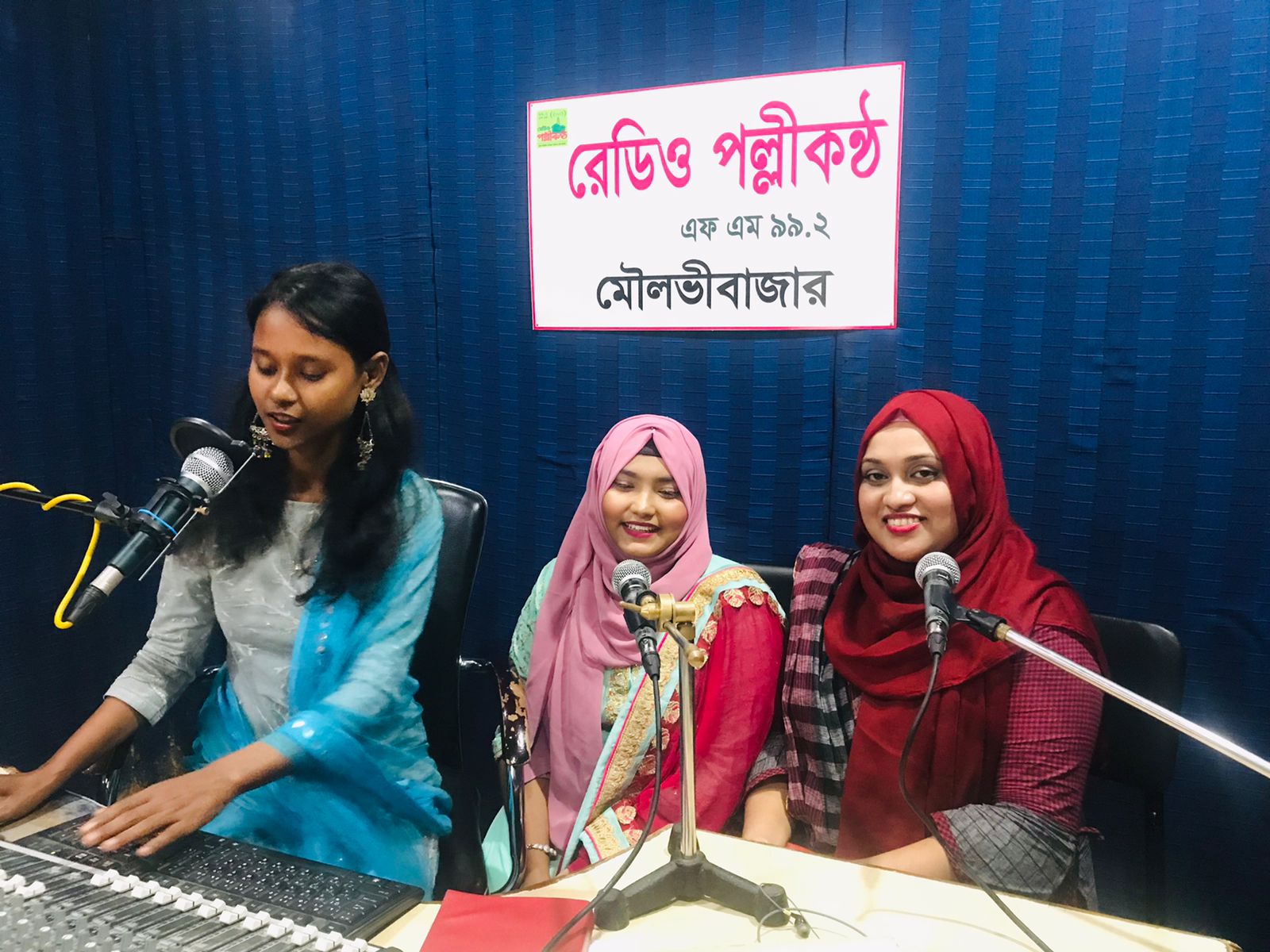 60. Challenges
60. Challenges
Please describe the qualitative and quantitative economic, social, and environmental impact of the project.
One of the important ways to enhance women’s status in the family and workplace was to uphold their skills and knowledge of digital financial literacy and planning that would be useful to the family and workplace. These skills and knowledge would put them in a good position to discuss and influence change. If women knew more about money management through Mobile Financial Services, Online Agent Banking, and Digital Payment, it would certainly improve their status in the family. This project capacitated the rural youth women on financial literacy and planning through information and knowledge and encouraged self-learning. But a more important and needed area is to create employment opportunities through education, entrepreneurship, and present-day vocational training, that offer a sustainable, empowered livelihood for women. For this, it necessitates a comprehensive approach incorporating collaboration between government agencies, the private sector, media organizations, civil society, and individual citizens.
